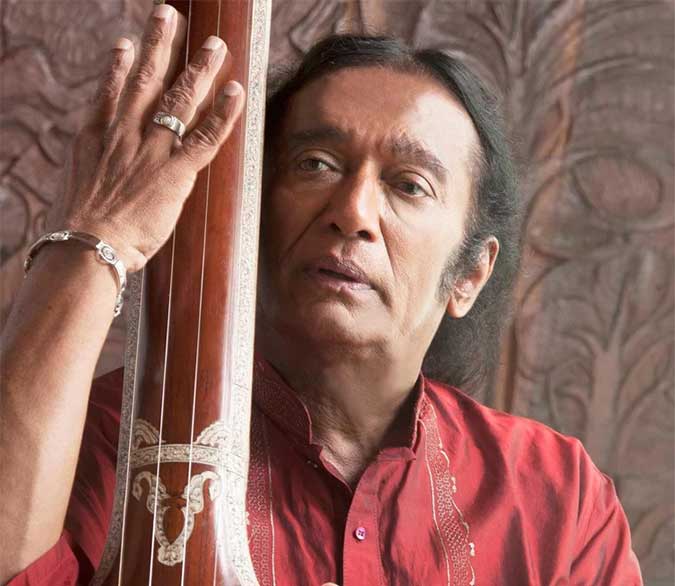Reflecting on Victor Ratnayake-By Uditha Devapriya
 Source:Island
Source:Island

Somewhere in early 2015, I took the bus from Maradana to Nugegoda, the 176. It was, by all accounts, an ordinary weekday morning, and people were going about and shuttling from one workplace to another. Normally, the 176 bus can be a long ride, but on this occasion, it wasn’t. Having left a meeting with a friend, I was now on my way to get a gift for my father, a book at Sarasavi. It would have been around 10 am when I boarded the bus, and it was around an hour and 10 minutes later when I reached Nugegoda.
There was, I recall, hardly a sound. The city seemed to have gone to sleep, apart from the occasional public announcement and the passing trains. As I stepped down from the bus, however, the loudspeakers along the road to the Station played a song. It took some time for me to catch the lyrics. They were playing Victor Ratnayake’s Pawe Wala. Almost at once, in an otherwise quiet hour, it revived that entire area. One by one, the people by my side and on the main road, starting from the lottery ticket sellers, began humming the tune. It looked like a scene from a musical – and at one level, it was.
It seems surprising to us now, but Pawe Wala was not written for Victor Ratnayake. It was originally written for Mervin Perera, whose voice, in certain respects, resembles Victor’s. At the last SA Prasangaya, held in 2012 at Colombo, Ratnayake remembered Mervin and his act of allowing his friend to perform the song. “I am a Buddhist,” Ratnayake told his audience, “and as a Buddhist, I wish that Mervin attains Nibbana.” It was not merely a tribute from one singer to another: it was, as Ratnayake himself would agree, an acknowledgement that, in the performing arts, it is not always profit that matters, but also, and more importantly, the sense of camaraderie which invariably springs up between artistes.
Today of course, for all intents and purposes, Pawe Wala is decidedly Victor’s. It is, I think, roughly what Ratna Deepa is to Amaradeva and Ol’ Man River is to Paul Robeson: his signature tune, the one which helps us identify the man and his work. In the pantheon of singers and musicians, in Sri Lanka, Victor Ratnayake is certainly more than a singer and a musician. He is, as Carlo Fonseka wrote on the eve of the last SA Prasangaya 10 years ago, the successor to Amaradeva, the king of Sinhala music, the emperor who rules supreme. He is all these things, and more. To me, however, he is, and always will be, Victor.
Victor Ratnayake has that inextricable, magical ability to make you forget what you are doing by summoning his voice. Amaradeva had that ability too. But Amaradeva was and is of a different order and temperament. While Victor sings of the moment, the present, the joys and sorrows he is going through now, Amaradeva’s concerns seem more mundane, spread across a wider canvas and landscape: the country, its people, its heritage. Victor’s work, on the other hand, has always centred on the self: it is more Dionysian, more affirmative of the individual, one could almost say more oriented to the ego, than Amaradeva’s. In this respect I think his definitive song would be, not Pawe Wala, but Sanda Hiru Tharu.
සද හිරු තරු පවතින තුරු අපි මැරෙන්නෙ නෑ
අනඟ බඹර තරුණ අපි අමර වරම අපිට හිමි
අපි මැරෙන්නෙ නෑ අපි මැරෙන්නෙ නෑ
In much of his work, Victor rebels not merely against convention and conformity, but the very strictures and codes that govern life and death. Life, he points out in the above lines, is followed by death, and then again by life: this is the typical, conventional Buddhist view of things. But instead of turning that into an object of contemplation, as Amaradeva does in those countless songs of his which venerate Buddhism and Sinhala culture, Victor celebrates it: life may be followed by death, but it is also followed by life, and as long as that holds true, we will never die. We will keep returning to this earth. We will keep on living.
It would be simplistic, if not inaccurate, to reduce Victor Ratnayake’s work purely to this optimistic view of life. Victor’s views are not always cheery or optimistic, and they do not always celebrate life. They also give us reason to grieve, to cry, to brood, to contemplate. Miyuru Kalpana and Sanda Kan Wasila, the latter more than the former, delve into that impenetrable sadness which goes into loving and devoting one’s life Sanda Kan Wasila, a thinly veiled lament by a lover – more likely a husband – who has been jilted, the author constantly emphasises his sense of betrayal. And yet, somewhere down the line, the lover silently wishes that she who has betrayed him returns to him.
සොයා එන්න ගණඳුර තරු නිවලා
මගේ එළිය අද ඔබ පමණි
Unlike Sanda Hiru Tharu, where the performer affirms life wherever and whenever, at night and in day, here he draws a clear, almost Manichean distinction between darkness and light. There is a constant interplay between these two polarities. The result of it all is to emphasise a sense of melancholia and a lack of hope. Unlike Amaradeva, whose lyrics, even at their most sorrowful, represses and modulates, Victor gushes out. He does not reveal all his feelings at once, but he is definitely willing to reveal what they are. He may be controlled in what he expresses, but he we sense that he wants to express.
Victor’s life, of course, has been as colourful as his music. Yet one comes across not just parallels, but also contradictions, between these two. His life, in that sense, is not only an affirmation, but also a negation, of the ideals his songs relate to. For just as he has sung of rebellion, defiance, he has also sung of history, heritage, culture: of values that promote, not defiance, but conformity. “Victor Ratnayake,” a friend of mine argued some time ago, “has contributed indelibly to the Sinhala Buddhist heritage of this land.” This may not be a totally accurate reading of Victor’s work, but it is correct, and justifiable.
Yet, again, one comes across a contradiction here. The man who affirms life at every corner and turn may turn around and sing of the history and heritage of this country and its people. He may be a “nationalist” who, from time to time, airs views that seem controversial and in fact are. But Victor Ratnayake’s entire life, from his heyday in the SA Prasangaya to his other shows and concerts, even those from recent years, has been a negation of the austerity and conformism he has promoted in many of his songs. In this he is, I believe, closer to Nanda Malini than to his other contemporaries, such as Sunil Edirisinghe. Like Malini, he dwells on love, but also mundane matters. The difference is that Malini has been much more sensitive and susceptible to the political element in art than Victor has ever been.
Certainly, it is disconcerting to listen to lyrics like the following, from a man who has spent half his lifetime celebrating the joy of living. This is from Budu Hamuduruwo, which, like Dewram Vehere, is Victor’s most plaintive religious song.
බුදු හාමුදුරුවො අපිත් දකින්නැති
බණත් අහන්නැති ඒ කාලේ
නිවන් දකින්නට පිං මදි වෙන්නැති
ඒකයි තවමත් සංසාරේ
Whereas in much of his other work the man dwells on the inevitability of life, here he downright broods on the futility of living. We are not fortunate enough, he tells us, to comprehend or imbibe the teachings of Buddhism. This, he adds, has kept us from escaping the samsaric cycle, that same cycle he celebrates in songs like Sanda Hiru Tharu. In Budu Hamuduruwo and Dewram Vehere Victor more or less transforms from a bon viveur to a moralist and a preacher, castigating us for affirming life too much.
All in all, I would contend that Victor Ratnayake’s voice has been an advantage to him in this transformation: it lends itself as easily to his secular songs as it does to his more mundane ones. In that sense, he is hard to frame to one mood or to one temperament: he embodies many moods, many temperaments. To that end, he has succeeded in embodying an entire country and an entire people: saddled with paradoxes, too many of them, but at the end of the day, united despite them. This, to me, will always be Victor at his best.
The writer is an international relations analyst, researcher, and columnist who can be reached at udakdev1@gmail.com.







